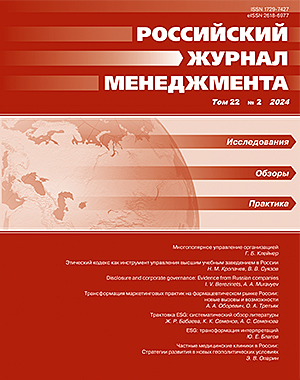Multipolar management of organization
DOI:
https://doi.org/10.21638/spbu18.2024.201Abstract
Purpose: to explore the most well-known configurations of the organization’s governance system, to identify their advantages/disadvantages and to come up with a new structure of management system built upon the poles of an organization which represent the seat power of influence on the major components of its internal environment.
Methodology: the paper being theoretical employs the systemic economic theory, the theory of social leadership, the elements of the theory of psychological types to substantiate the “pole” structure of organization as a mean of strengthening the integrity of the organization and improving managerial performance in unstable external environment.
Findings: the management toolkit of organization has been expanded due to a new multipolar management system based on separating the entire body of the employees into groups around a limited number of intra-organization poles — specific attractors in the internal domain of an organization. The study shows that the upper level of the poles structure includes four poles which correspond to the four basic types of socio-economic systems. From the managerial perspective, these poles are represented by four types of leaders which can be characterized as inspirational, intellectual, cultural and spiritual. Their activities form a unique field structure in the intra-company space that, due to the emerging pull-and-push factors, influences the work of both internal and external participants of the organization’s activities.
Originality and contribution: the paper synthesises three approaches to company’s management principles — systemic, social and psychological. The original results obtained in the paper hold out the prospect that the concept of four-polar management of economic units through the theory of social leadership can be harmonized with the concept of managing macro- and meso-level objects from the external environment of the organization.
Keywords:
multipolar management, quadripolar management of organization, systemic economic theory, social leadership, management styles
Downloads
References
References in Latin Alphabet
Translation of references in Russian into English
Downloads
Published
How to Cite
Issue
Section
License
Articles of the Russian Management Journal are open access distributed under the terms of the License Agreement with Saint Petersburg State University, which permits to the authors unrestricted distribution and self-archiving free of charge.





